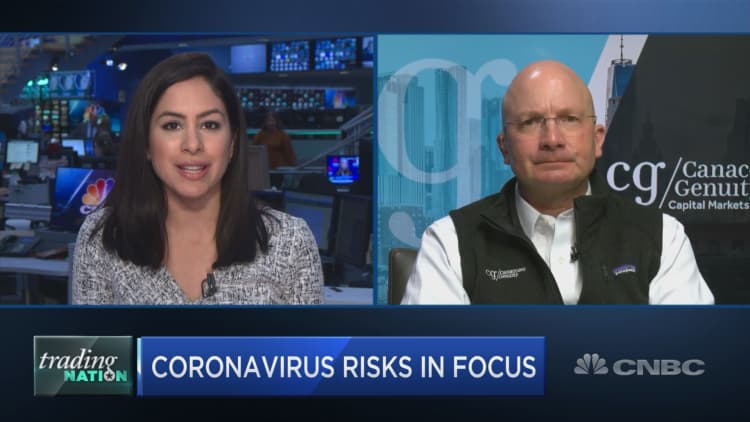
Four are better than none.
As the major averages continue to trade in record territory despite growing worries around the spread of the coronavirus, Tony Dwyer, chief market strategist at Canaccord Genuity, sees four reasons for investors to stay optimistic on the outlook for U.S. stocks, he told CNBC's "Trading Nation" on Tuesday.
"There's four reasons to be fundamentally bullish here," Dwyer said shortly after Federal Reserve Chairman Jerome Powell told lawmakers in his semiannual congressional testimony that the central bank was "closely monitoring" the coronavirus and its effects on the global economy.
1. Easy money
Thanks to the Fed, reason No. 1 is "easy money," the strategist said.
"You've got a super low inflation rate. The Fed is more fearful of low than high inflation. You've got a super easy Fed. And think of the historic low in corporate bond market yields," Dwyer said.
He pointed to the Moody's Baa Bond Index, which measures the yields on the lowest-rated investment-grade corporate bonds.
"The Moody's Baa Index is trading at a record-low yield, which means companies can raise money, any amount of money they want, at the lowest interest rate on record for the lowest … level of investment grade," Dwyer said. "That's a huge deal because you go into a recession when companies need money and don't have any access to it or can't afford it."
Now, not only do companies have access to capital, but they can afford it, the strategist said.
"The backdrop is easy credit because of low inflation and [an] easy Fed, and there's nothing that's coming out in the data that's suggesting that's going to change anytime soon," he said.
2. Full employment
The second reason behind Dwyer's fundamental confidence is the near-full state of employment in the United States, as exhibited by the two-year low in job openings and January's notably stronger-than-expected jobs report.
Sometimes, investors lose sight of the employment landscape because they assume "the Fed is providing this liquidity," Dwyer said.
"What's really providing the jobs and the money for the market and the excess spending power comes from full employment. That's the true story of the domestic economy," he said.
3. High confidence
Reason No. 3 to stay bullish, at least on the underlying economy, is high consumer confidence, Dwyer said.
U.S. consumer confidence grew more than expected in January, hand in hand with improvements in the labor market, which tells Dwyer that a recession is likely far off despite recent warning signals in the bond market.
"There's always so many concerns and fears, but, ultimately, it comes down to: do you have a job? Do you have access to credit? And do you have the confidence to use it?" he said. "If all of those factors are yes, which they have been now for, really, 11 years … it's hard to make the case that the household spending is going to contract."
4. Millennials
We know what you're thinking: Isn't this demographic the death knell for nearly every industry from motorcycles to paper?
If you ask Dwyer, millennials could actually have the opposite effect when it comes to the U.S. economy.
"You have full employment with easy money and high money availability, high confidence and a millennial demographic that's going into the household formation years," he said. "The peak birth year for the millennial demographic is turning 30."
As that population begins to settle down and buy homes — with Realtor.com projecting that millennials will purchase more houses in 2020 than any other demographic — it should cushion the U.S. economy in the face of market weakness, Dwyer said.
"When you have that kind of demographic tail wind with those other factors ... it's hard to go into a recession and that's ultimately the story of why the market suffers more meaningful corrections," the strategist said. "We think it's correcting now. Maybe not in the … mega-cap tech stocks, but the internals of the market are correcting. It's actually kind of healthy."






